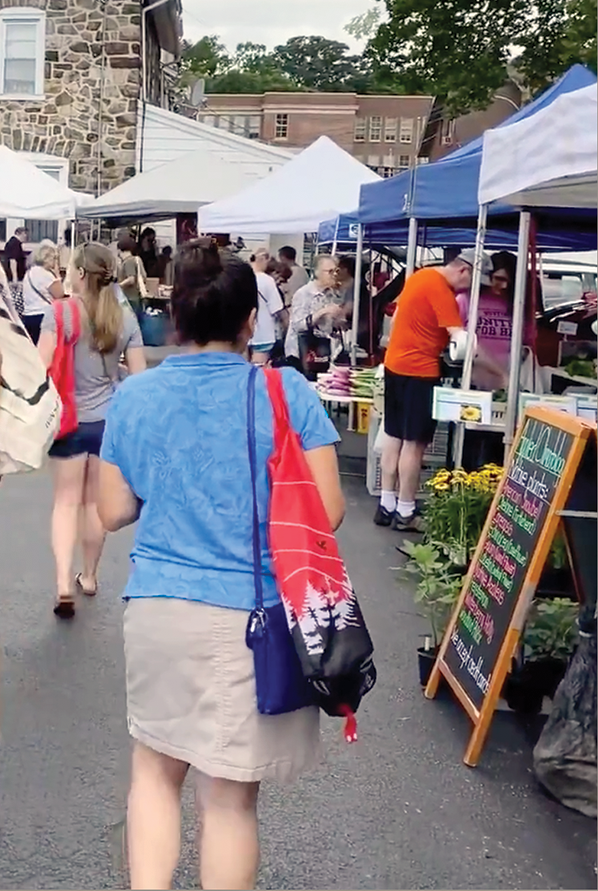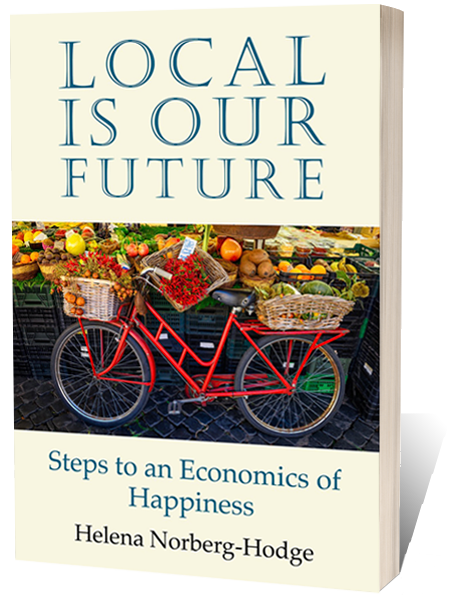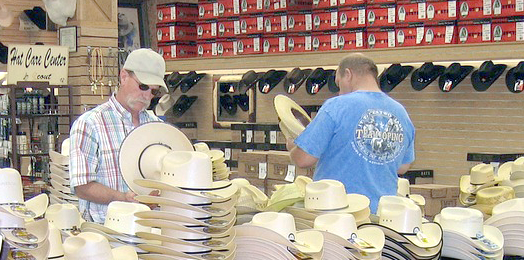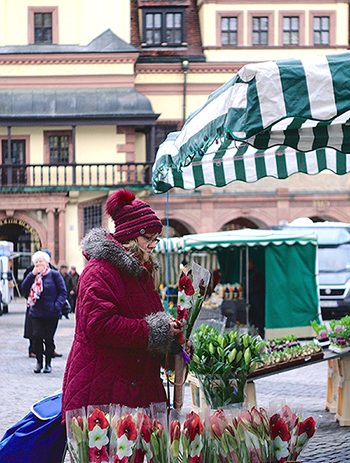– a guest post from new member, Mark Bernstiel
What does “local economy” mean to you?
First, there’s “local,” from the Latin localis meaning “pertaining to a place.” It brings to mind a place, most likely where you’ve originated from, typically return home to, or are presently located in. It might be as specific as what’s within physical reach or as expansive as a neighborhood, region, country, planet, solar system, and so forth.

Then, there’s “economy,” from the Greek oikonomía meaning “household management” (oikos “house, dwelling place, habitation” and nomos “managing, law, usage, custom.”) The dictionary defines it as “a system of interaction and exchange,” so basically money or trade. “Economy” has also been used to mean frugality and the efficient use of material and non-material resources. While practiced in countless ways, the principle of the economic relationship is evident in everything from the reciprocal relationship between pollinators and plants to the central position “the economy” has in American politics.
Coupling these terms, a “local economy” can mean an efficient system of exchange of resources based in a particular place.
Despite this simple interpretation, the concept has become increasingly complicated for the majority of those in the Western world. Many questions arise: How are the bounds on place set, where does the managed “household” begin and end? How is efficiency in the use of resources defined, and who determines what sources can be used? Who is impacted by the exchange, and do all those impacted have equitable influence throughout the interaction?
Globalization Pros and Cons
These questions become even more complicated when considered in our globalized economy. Every instant of every day, people engage in a worldwide web of exchange. These interactions are shaped by a market-driven system designed to minimize costs and maximize profits.

Supply chains can be obscure, convoluted, and often destructive. The underlying assumption is that any loss this system causes is insignificant to the value it produces, whether that be increased productivity or convenience or decreased financial costs, celebrated as “progress.” One might celebrate a vaccine as evidence of the positive impacts from our global economy, while another might laud having cheaper T-shirts. The same may argue that this “juice is worth the squeeze,” although the squeeze can conceal modern slavery, complex production systems, and environmental degradation. The concept of globalization sparks intense debate, and proves that the global economy is not simple, nor are its benefits and consequences.

Proponents of local economies, like myself, might argue that the juice from globalization is not only not worth the squeeze, but that the juice itself contains poison. Supposed benefits, such as convenience, may actually decrease the quality of life for all beings, particularly in the long term. However my goal here isn’t as much to critique globalization as it is to acknowledge how it contrasts to a healthy local economy.
How Localization Compares
In her book, Local is Our Future, Helena Norberg-Hodge defines localization as “a process of economic decentralization that enables communities, regions, and nations to take more control over their own affairs.” Pairing this perspective with our earlier definition of a “local economy,” we can begin to see the benefits that come from more localized exchanges.

Some beneficial effects of a healthy local economy include:
- Wealth accumulation: Local economies keep money within their communities. Studies show that dollars spent locally recirculate 2-4 times more than money spent at non-local companies. Supporting our local entrepreneurs provides our neighbors with viable work while fostering economic stability in our communities.
- Knowledge/skill sharing: Wealth retention isn’t limited to financial resources, as people are more likely to lend and learn expertise with their neighbors and peers, creating a more reliable and adaptable workforce.
- Minimized environmental destruction: Local production and consumption can lessen negative ecological impacts. As stakeholders and resources are in closer proximity, waste and carbon emissions can be reduced.
- Restored community fabric: In local economies, people are more likely to know and trust their neighbors, leading to stronger social bonds and shared purpose. This deeper sense of belonging and connection across communities leads to increased civic engagement and democratic participation.
- Cultural preservation: When businesses and artisans create products that reflect the traditions, values, and practices of their region, they contribute to the cultural prosperity and heritage of the community.
- Pleasure and joy: The personalized experiences in local markets, events, and businesses often provide a deeper sense of significance and satisfaction. Access to fresh, locally grown food and having walkable neighborhoods are among factors that prompt a healthier lifestyle.

This all might sound idyllic. Make no mistake, a local economy is not inherently the perfect solution for all our societal issues. It can, and does, fall prey to some similar failings found in the global economy.
However, in the face of severe social inequity and climate catastrophe, the urgency for amending our business practices has never been greater. Local economies are unique in offering necessary opportunities to cultivate a sustainable and just future for all beings.
Looking to the Future
There is no “quick fix” for building a healthy local economy.
We won’t find all the answers in one place—we will find it with each other, in our collective imagination and willpower. There are grassroots initiatives, many led by communities of color, that are proving how people can do a better job tending for their own basic needs than the handful of monopolies that currently dominate the global economy.

Groups like Transition Town Greater Media can help by developing skills and making meaningful contributions towards a more inclusive, self-sufficient world for everyone.

When discussing the local economy with peers, I’m often met with sincere enthusiasm weighed down by hopeless skepticism, mainly driven by personal financial constraints. My friends (and even myself) ask “How can I support local entrepreneurs if their products cost more than those that are at [insert name of big-box store]?” There’s no question that many of us are facing real and significant monetary pressures. As we consider what is best for ourselves, our communities, and our planet, we are constantly faced with decisions regarding our purchasing power. There’s no clear answer for everyone, yet there is a fundamental and inconvenient question.
If we are so concerned with costs and trade-offs, then before moving any further, shouldn’t we ask, “What are the costs of us not building our local economies?”

Leave a Reply